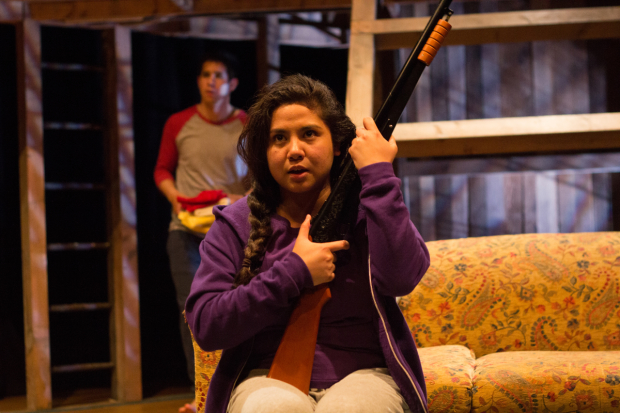Edith Can Shoot Things and Hit Them

(© Paul Fox)
There has been no shortage of tales about spunky, abandoned children since Hansel and Gretel first followed a trail of breadcrumbs into the forest. However, playwright A. Rey Pamatmat has updated the tradition in Edith Can Shoot Things and Hit Them, now running at Boston Center for the Arts, by adding a love story that gives the older brother a same-sex romance with a boy from his math class and that arms the little sister with a pop-gun rifle and a bow and arrow to guard the family home.
Edith (Marie Jan Carreon), a 12-year-old who is wise beyond her years (though still very much a child), lives with her 16-year-old brother, Kenny (Gideon Bautista), her devoted guardian and quasi-parent, but they are largely on their own. Their mother died, and their father has moved in with his girlfriend. Dad rarely visits, only depositing food and gas money in their bank account when he remembers to do so.
Kenny and his pal, Benji (Eddie Shields), find their friendship changing into a sexual relationship, complete with secret meetings, shy gropings, and ecstatic love letters exchanged and pressed to their hearts. Unlike Kenny with his adult responsibilities, Benji depends on his overprotective mother to pick out his clothes every day and bring him a glass of milk at bedtime. Edith accepts Kenny's feelings for Eddie, allowing the three of them to form a protective family.
Kenny and Edith's ability to cope comes to a crisis after she shoots and hits an unexpected target and must suffer the consequences, followed by a blow-up between Benji and his mom when she discovers the fervent affair between the boys. The carefully laid-out plot lines in Act 1 are untangled in a helter-skelter second act that borrows the fairy tale resolution of the children fending for themselves to solve their problems.
Carreon, Bautista, and Shields are young-adult actors who deserve high praise for creating believable and bearable portraits of Edith and the two adolescents. Carreon's Edith is an assertive girl who hides her fear and insecurities under a distinctly unchildish bravado; Kenny finally becomes less protective of his missing father and takes charge of the difficult situation. Shields plays Benji as a giddy, giggly nerd until he learns from his friends how to care for himself and stop looking for monsters under the bed. Although we hear about the reactions of the adults, they never appear onstage.
Director Shawn La Count, the artistic director of Company One which has mounted this production, treats the children and their dilemma with respect. He has carefully guided them through the escalating action on the picturesque, rough-hewn set, designed by Cristina M. Todesco. Rising three stories from the stage floor, the massive construction looks like a tree house for the Swiss Family Robinson, crossed with the living room of a '90s television sitcom.
Like the playwright and his family, Kenny and Edith are Filipino-Americans living somewhere in small-town, middle America, but other than the casting of the actors and several references in the dialogue, their ethnicity has little bearing on the play. The same holds true for the two characters in Pamatmat's After All The Terrible Things I Do, also currently running in Boston: a one-two punch that introduces local audiences to his work. In Edith Can Shoot Things and Hit Them, Pamatmat has given contemporary theater an endearing pair of children who grow up in spite of obstacles put in their way by the clueless adults supposedly protecting them.











